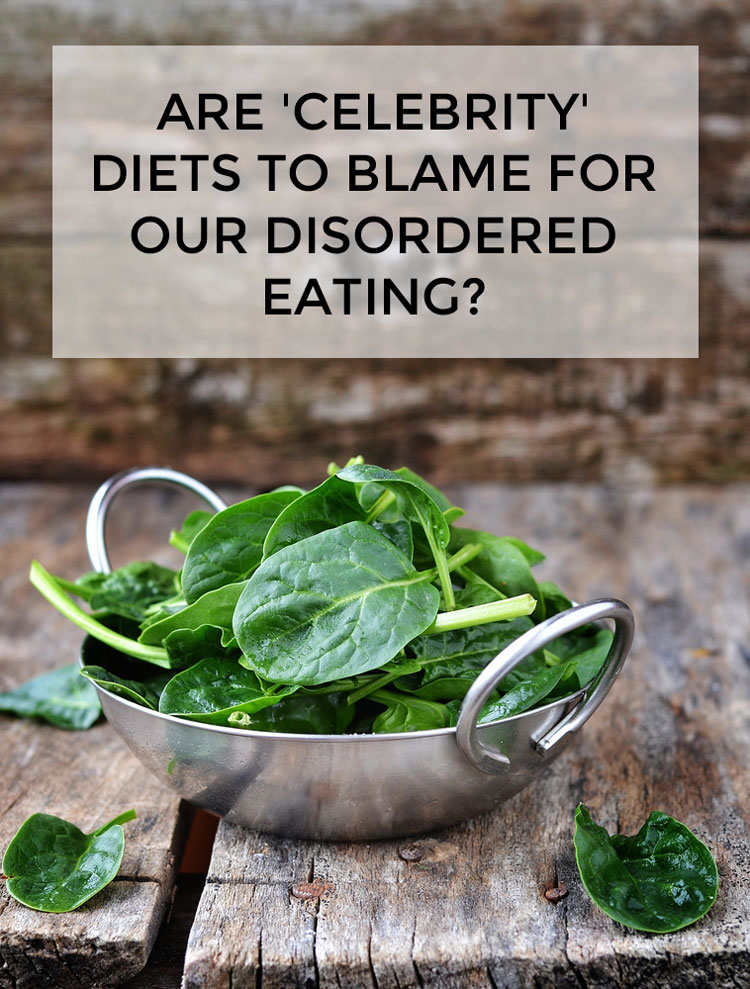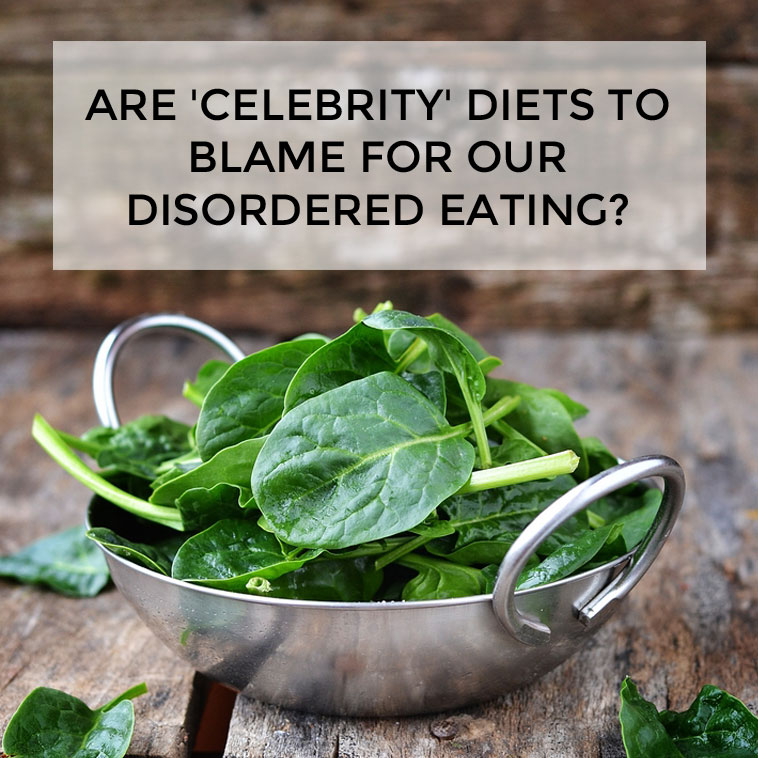
Late last year, I found myself privy to an interesting conversation (via their podcast) between Mamamia’s Kate Leaver, Mia Freedman and Rosie Waterland. The topic was “are celebrity dieters like Pete Evans and Sarah Wilson encouraging extremism in eating?”
Mia was on the fence. She said she found these diets triggering for her, but was happy for people to do whatever worked for them.
Kate and Rosie however were not on the fence. They were firm in their belief that there is absolutely no room in the world for ‘celebrity’ diets like Sarah’s (I Quit Sugar) and Pete’s (Paleo) because they lead to extremism and eating disorders.
Kate: “I personally hold people like Pete and Sarah responsible for taking the joy out of eating. I think they’ve made the world of diets and health into a cult-like space and they’ve made eating healthy about shame and discipline, not even about being healthy anymore.”
Rosie: “It really wasn’t until I tried to live like these people were telling me to live that I developed a really severe thyroid disorder and ended up going in the complete opposite direction to what I wanted. It ended up being the unhealthiest thing for me and I now have to be extremely careful about diets and advice like Pete Evans and Sarah Wilson give … I have friends who are the same … I have a friend who spent years as a bulimic and he started on Sarah Wilson’s diet and about six months later his bulimia had re-triggered.”
The reason I found the above interesting is because I have my own 12 year history of disordered eating (specifically over-eating and thinking about food every single minute of every day). During this period in my life, I managed my weight by over-exercising (I also called it ‘training for triathlon’ and ‘training for marathons’). This was the perfect crime until I had kids and I didn’t have time to over-exercise any more.
So then I had to resort to ‘dieting’. As someone with a degree in Exercise and Sports Science, I subscribed to the ‘calories in vs calories out’ method of dieting (because that’s what I’d been taught at Uni). This meant I spent each day carefully tracking everything I ate and ensuring that intake was offset by exactly the right amount of output (exercise). You can imagine how screwed my head got doing that day in, day out. I’d also been taught that effective weight management involved staying right away from fat in my diet. So I obsessed about that too.
Then Sarah Wilson (whose blog I’d been reading for years) launched her I Quit Sugar (IQS) program.
Like many people, I’d tried before to quit sugar, (as in ‘gone cold turkey, felt deprived, gave up after three days’) so I was interested to see what IQS brought to the table. Here are the things that surprised me about the program:
- I found it very gentle (not ‘easy’, but gentle). Out of the eight weeks only a few involved any kind of ‘cold turkey’ action.
- Unlike when I was doing my ‘calories in vs calories out’ thing, I never felt hungry. I suspect it was because I was eating a lot more fat.
- Yes, the program encouraged you to eat good fats.
- I never felt deprived because the program was highly focused on what you could eat instead of what you couldn’t.
- All the gastro-intestinal issues I used to have (painful bloating, flatulence and constipation on a daily basis) disappeared. Completely.
I’ve now stuck with IQS for three years and there are two main reasons for this.
The first is mentioned above – the significant effect it had on a very dysfunctional gut. (I’d seen many a nutritionist and doctor about my gut issues over the course of many years before I did IQS. They all told me to drink more water and eat more fibre. Sound advice, sure, but following it made no difference for me.)
The second is that I no longer think about food every minute of the day. I think that’s because the base principles of the program (which have become part of my everyday diet) have made it easy for me to manage my weight without having to obsessively track calories. I can’t even begin to tell you how big this is for me.
So as you can see, my personal experience is different to that of Rosie and Kate.
Some other questions they raised in the podcast that I’d like to share my thoughts on:
Do Sarah and Pete facilitate extremism with regard to diet?
Sure they do – for those who are prone to extremism.
But here’s the thing when it comes to people who are prone to extremism. If it’s not Sarah or Pete’s program it would be something else. People prone to extremism can draw as much permission to be extreme from a qualified medical professional as they can from ‘some celebrity on the internet.’ (I used to be a triathlete – I’ve seen a lot of extremism.)
Do Sarah and Pete demonise whole food groups?
If they do, then by the same definition doctors and nutritionists have been demonising fat for the past 50 years.
Are Sarah and Pete creating shame around the ‘banned’ foods in their ‘diets’?
I’ve felt great shame after a nutritionist went to a great deal of trouble creating an eating plan for me and I had to go back to them a month later and admit I didn’t stick to it. Did that nutritionist create that shame or did I?
—-
Here’s what I find interesting about conversations surrounding IQS and Paleo. A lot of column inches are currently being devoted to hammering two ‘diets’ that:
- Are not specifically asking people to restrict calories.
- Encourage people to get back in the kitchen and make their own food from scratch.
- Focus on eliminating foodstuffs that contain additives, preservatives and highly processed grains and sugars.
- Provide tons of options for what you can eat to reduce the focus on what you can’t.
- Provide a framework around which people are encouraged to experiment and find what works for them.
Another thing I find very interesting when it comes to conversations around ‘celebrities causing extremism with regard to diet’ is the non-inclusion of Michelle Bridges’ 12 Week Body Program.
Michelle ticks these same boxes when it comes to some of the criticisms levelled at Pete and Sarah:
- Celebrity.
- With no formal nutrition qualifications.
- Making lots of money from her programs.
In addition to the above, her 12WBT program not only specifically restricts calories, it also prescribes a very high exercise load.
If ever there was a program those prone to extremism should avoid, this is it, yet I can’t recall seeing an article anywhere highlighting the ‘dangers’ of 12WBT.
Now don’t get me wrong. I think Michelle Bridges is brilliant and I know countless people who’ve gone on to make lasting, positive changes to their diet and introduced exercise into their lives on a long-term basis thanks to her.
The same way I know countless people who’ve taken what they’ve learned from Paleo and IQS, adapted it to their lifestyles long term and are now a whole lot healthier as a result.
Which brings me back to the original question: are ‘celebrity’ diets to blame for our disordered eating?
Well I’m not going to pretend I’m qualified to give any kind of definitive answer to that (and frankly, I don’t think anyone on earth is). But I believe we only get to point the finger of blame at a person or diet once we’ve stopped to take some personal responsibility for our own actions first.

